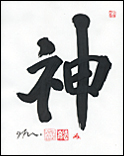Gods and kami: etymology and semantic drift
 When I wrote in an earlier post about Japan’s “Batting God”, “God” was a direct translation of the Japanese kamisama . The nuances line up perfectly. Both Gods and kamisama are unrivaled, omniscient, and omnipotent entities—in their particular contexts, batting in this case.
When I wrote in an earlier post about Japan’s “Batting God”, “God” was a direct translation of the Japanese kamisama . The nuances line up perfectly. Both Gods and kamisama are unrivaled, omniscient, and omnipotent entities—in their particular contexts, batting in this case.
So it’s not surprising that when Christianity reached Japan, the native word kamisama was immediately adopted as the translation for “God”. (African tribesmen also used native words for supernatural beings to refer to the new white God the missionaries introduced.)
“God” itself derives from the Proto-Indo-European “ghut”, meaning “that which is invoked”, “that which is called upon”, although some scholars think the origin is a word meaning “to sacrifice”. The alternative, deva/theos/deus/dios/dieu, derives from a different Indo-Germanic root meaning “to shine”.
Originally “god” and its etymological forebears indicated any spiritual force or influence present in a thing, a phenomenon, an animal, or a place. This nuance is extremely close to that of the Latin “numen” (whose original meaning, by the way, is “a nod of the head”).
Interestingly, this is also precisely the original nuance of the Japanese word kami. Kami are the gods or spirits worshipped at each Shinto shrine, and indeed the name “Shinto” means “Way of the Kami”. A kami could be the spirit of a well-known local figure, a more traditional historical/mythical god-type being, or, just as easily, a river, mountain, animal, or even rock. I remember visiting one shrine where the object of veneration, located on the back wall and symbolizing the kami being worshipped, was simply a hole in the wall—letting you gaze through at the mountain behind the shrine. The mountain was the kami.
[Note that many students assume that kami meaning God is the same word as, or shares an origin with, a different kami meaning “up”/”above”. But linguists tell us that this is not the case—the “mi” of the kami meaning God was originally a different sound than the “mi” of the word meaning “up”. So just as English “god” and “good” are not related (God is not necessarily good?), neither are Japanese kami/god and kami/up (God is not necessarily up?).]
We thus have the odd historical parallel that words which originally pointed to a diversity of spirits, immanent in objects and places, were borrowed to refer to a monotheistic entity in both hemispheres: the West (“god”) and, much later, the East (“kami”).
(Calligraphy by Kanjuro Shibata Sensei.)
